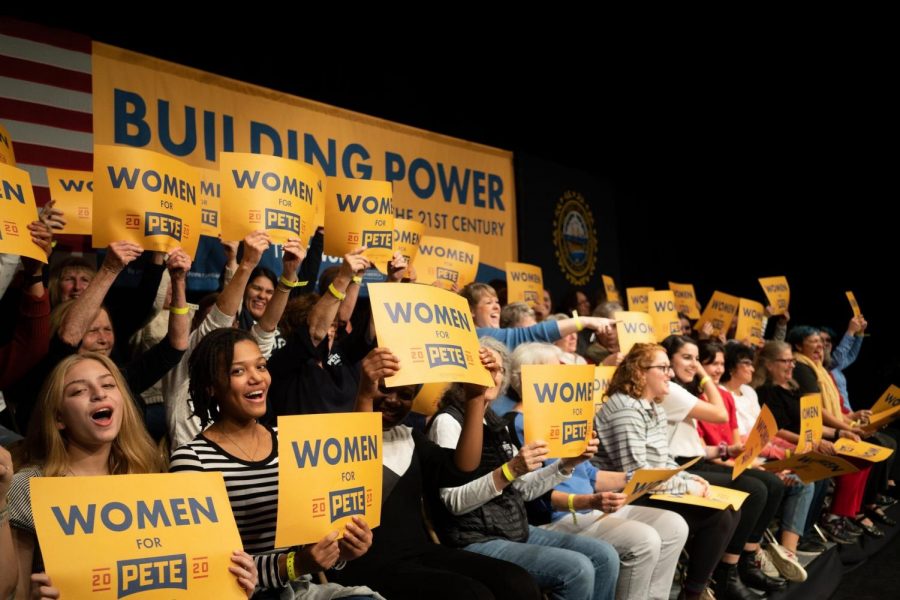On Thursday, Oct. 24, I was sitting in a lecture when my friend invited me to a spur-of-the-moment drive to New Hampshire to see presidential candidate Pete Buttigieg speak at Bow High School. “Mayor Pete” would be outlining his new policy plan for women, “Building Power”. As an undecided voter, I was curious to hear what he had to say. After driving two hours north, we arrived about an hour and a half early, eager to get front row seats.
Upon arriving, we learned that we would need not worry about snagging a spot in the front row. As we were checking in, a staffer approached us, saying, “You three are young, would you be interested in sitting on stage with the mayor?” We were ecstatic, and gladly accepted the offer. I asked if we would have the opportunity to speak with Buttigieg, and his staffer claimed there was a possibility.
When the doors opened and the crowds found their seats, about 30 individuals remained in the high school lobby with my friends and me. We looked around at each other, realizing his staff had only selected women. There was a young group of high school girls, a few women of color, about two groups of elderly women, a pair of enthusiastic soccer moms, a girl with blue hair and the three of us, the college-aged women. His staff had concocted a diverse backdrop to frame Buttigieg’s speech, showing how women from all walks of life support the South Bend, Indiana mayor.
Next, a pair of staffers sat us on stage and instructed us to remove our jackets and turn our phones off. The pair gave each of us a “Women for Pete” sign to hold and told us to stand and cheer when the mayor came onstage. They taught us two cheers to perform, and repeatedly paced back and forth, asking us if we were excited. “Make sure to smile!” one of them advised.
Following speeches from Jess O’Connell, Jennifer Frizzell, and Mass. State Representative Maria Robinson, Buttigieg took to the stage. We did as we were told, cheering as loud as we could, and were rewarded with a polite nod from the mayor. His speech was incredibly moving. I was impressed by his prolific speaking and policy plans, but was left with questions. When Buttigieg asked for questions from the audience, I was excited to ask him how his plan would support college-aged women. Gazing out to the crowded auditorium, his back remained turned towards his female conglomerate. Not once did he turn around to hear the concerns of the women who were there to support him.
It was around this time that I began to feel like a human prop. The 30 women sitting behind Mayor Pete were his scenery, mere evidence of his alleged female support. Though his plan advocated for women empowerment, sitting behind him I did not feel empowered. I felt silenced. His campaign staff used the women in attendance that night as cheerleaders. Our job was to sit there, smile and look pretty as we cheered him on. We were not there to ask questions. We were not there to speak out of turn. We were there to wave our “Women for Pete” signs, nothing more.
Furthermore, his staff did not ask if I identify as a woman. Although I do, they assumed my gender identity, as well as all the women on stage, and handed us “Women for Pete” signs without a second thought.
At the end of the night, Buttigieg took the time to shake all of our hands. This was nice, but visibility earlier on in the night would have been better. Though my experience with Mayor Pete left a sour taste in my mouth, I am sure his staff’s tactics are not unique to his campaign. If anything, this experience gave me an inside look at all political strategy. This did not ruin my opinion of Buttigieg, but having now experienced the calculation and manipulation that goes into a political campaign, I am wary of every candidate. Campaign politics is a game of optics, a competition to see which candidate can paint the best image of themselves. 2020 candidates should strive to be genuine, not perfect.
To Mayor Pete and all the 2020 candidates: If you say you care about empowering women, don’t speak for us. Listen to us. Don’t do it for the cameras. Don’t do it for Twitter. Take the time to hear us speak and join us in building power.
Emma Garber is an assistant Op/Ed editor and can be reached at [email protected] and followed on Twitter at @EmmaGarber1.





















Alex • Nov 4, 2019 at 7:16 am
This is a very interesting perspective— I often wonder about the views of folks we see behind candidates reacting to speeches, and this is a great reminder that we should be careful not to make assumptions.
While you make your own completely valid feelings very clear, I am a little uncertain who you are speaking for in these sentences:
“Our job was to sit there, smile and look pretty as we cheered him on. We were not there to ask questions. We were not there to speak out of turn. We were there to wave our “Women for Pete” signs, nothing more.”
As part of the preparation for this piece, I wonder whether you reached out to your two friends, or any of the other forty-four women who shared the stage, to listen to them, to take time to hear them speak about their own feelings and their own experiences, and to check whether they join you in these collectively worded statements?